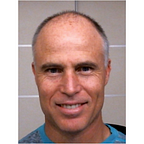I stopped sleeping because of a back operation.
After three months of 2–3 hours a night of sleep, my doctor suggested I take a sleep course. “A sleeping course? But I already know how to sleep!” I protested.
“Give it a try, at this point, you don’t have much to lose. We already tried three different sleeping pills, none of which worked,” the doctor replied.
I could see it in my mind’s eye, everyone would put their favorite sleep medication in an ornate box. The guide will lift up the box ceremoniously and shake it well. Then, we’ll take turns blindly choosing a tablet. Who knows? Maybe the random tablet will make all our problems go away.
Reality wasn’t nearly as fun. There were eight participants, a psychiatrist and a social worker. The psychiatrist, Lora, was the lead instructor. We met in a psychiatric ward as outpatients. We didn’t have a party, we learned sleep hygiene instead. Don’t sleep in the middle of the day, no cat naps, only go to bed at night when you want to sleep. Don’t recline a chair more than 20 degrees. Keep regular sleep hours. Don’t take any sleep medication. If you don’t fall asleep in 15 minutes, get up and do something active. Solid advice. It didn’t work for anyone in the group.
“Will taking cannabis help?”
“I only got home from work at 10pm, even though my regular sleep hours are 9pm — 6am, is it okay to sleep until 8am?”
“Can I read in bed? That’s one of my favorite pastimes,” I asked.
Everyone filled detailed sleeping logs. In our weekly meeting we would go over them. “Natasha, you slept from 10 pm to 1 am on Tuesday. What happened then?”
“I turned over from side to side, but couldn’t fall back asleep. Finally, I started reading the newspaper.”
“You should have gotten out of bed. For example, stretching, sitting at a desk writing, or filling a crossword puzzle,” Lora instructed.
I tried following the sleep hygiene rules, it was hard work. I really love loafing in bed reading a book; but that was out.
…
Three weeks later my doctor prescribed Marlozipan, “it doesn’t work for everybody, but you have exhausted all other options, you should try it.” With this cheery advice I left the doctor’s office. I looked at the tablet box, it didn’t look dangerous. Then I took one. I forgot the doctor said “one half is sufficient for the sleeping effect.”
I slept for two days straight. It was another two days before my eyelids stopped drooping. Then, reality shifted into focus. I felt alive again, I could think and imagine next week. I stopped staring into space once a conversation lasted more than 30 seconds. I had been going through the motions, with my mind somewhere far away, yearning but unable to sleep.
This was good news, however, in the next sleeping course meeting, my log was perfect. I started sleeping 7–8 hours a night without interruption. Lora warned me, “if you are sleeping this well, then you shouldn’t be in the course.” This was unexpected, I had never failed anything in my life, and here I was, about to flunk a sleeping course. I was just getting used to it, the guy who took Cannabis, the old woman living alone that was afraid to fall asleep, the limping woman that lived in a noisy apartment. They were just like me, wanting to, but unable to sleep.
Eventually, I did get thrown out of the course. I felt like a failure, even though my insomnia was cured. I guess other people need the help more than I do.
I resolved to never repeat my mistake. After my vertebrae fusion operation, I took prescription opioids for the pain. The pills were causing side effects, so I stopped taking them abruptly. It turns out that this has to be gradual, 10–25% less each week. Going cold turkey probably caused my insomnia.
